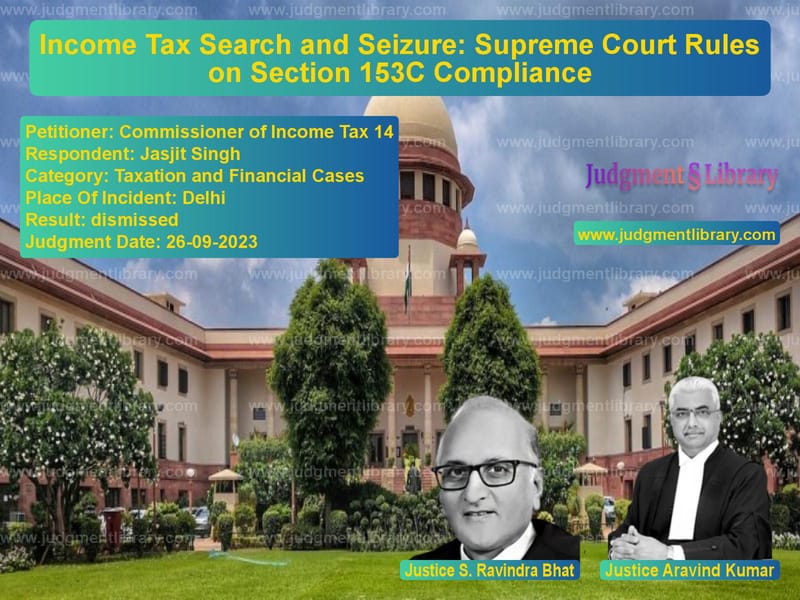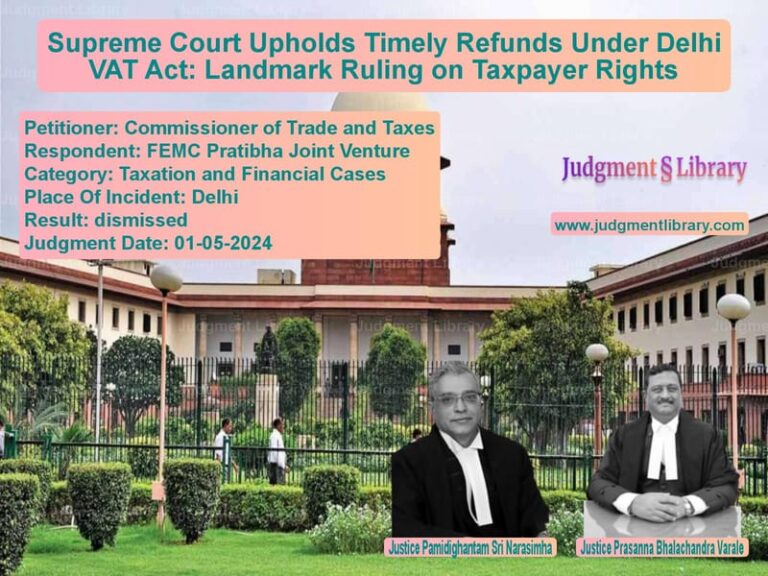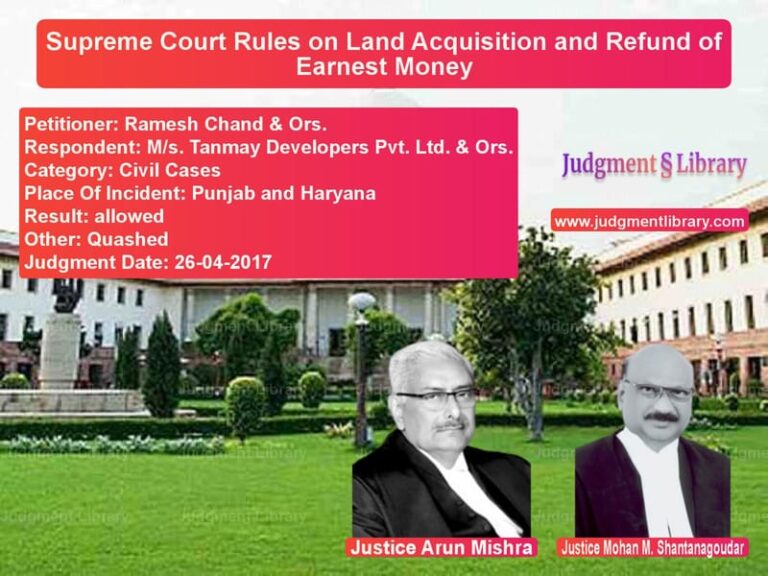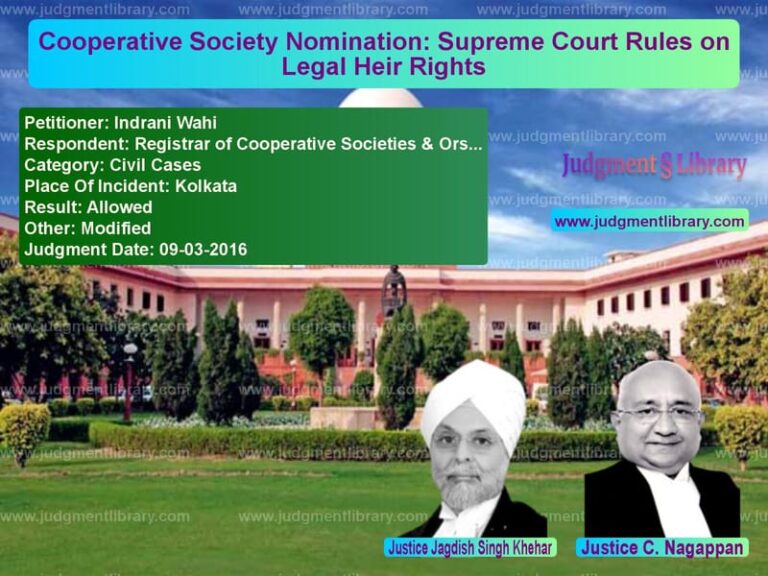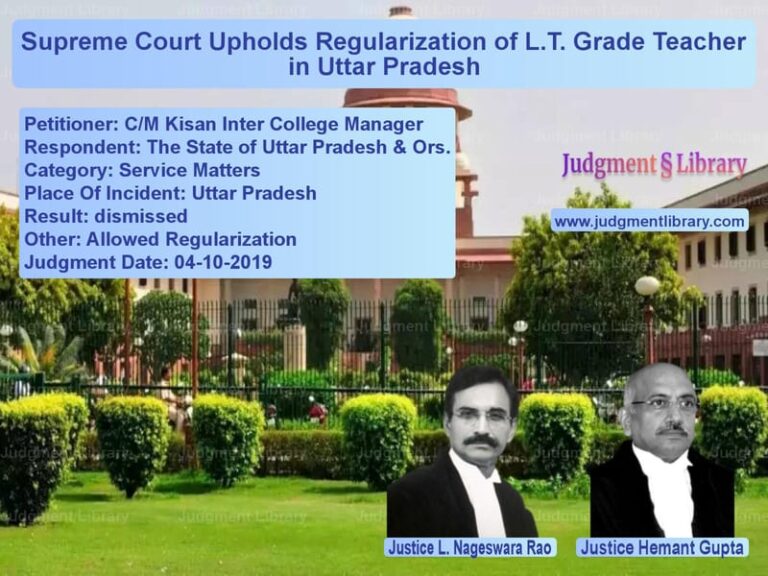Income Tax Search and Seizure: Supreme Court Rules on Section 153C Compliance
The case of Commissioner of Income Tax 14 vs. Jasjit Singh involves a crucial interpretation of Sections 153A and 153C of the Income Tax Act, 1961. The Supreme Court was called upon to decide whether the Assessing Officer (AO) could initiate proceedings against a third party based on documents seized during a search of another entity.
Background of the Case
The dispute arose after a search and seizure operation was conducted on Kouton Group on February 19, 2009. During scrutiny, the Income Tax Department claimed to have found materials that allegedly “belonged” to Jasjit Singh, triggering proceedings under Section 153C of the Act.
The Assessing Officer issued a notice to Jasjit Singh, claiming that the materials were linked to him and required him to file returns for six previous assessment years. However, the respondent contended that the period for filing returns should commence only from the date the seized materials were forwarded to his Assessing Officer and not from the date of the search.
Legal Issues Raised
The Supreme Court had to determine:
- Whether the date of initiation of search under Section 132 should be the reference point for calculating the six-year assessment period under Section 153C.
- Whether materials found during a search on one party can be used to reopen assessments of another party under Section 153C.
- The correct interpretation of the proviso to Section 153C(1) concerning abatement and limitation periods.
Petitioner’s Arguments (Income Tax Department)
The Revenue Department argued:
- The search and seizure proceedings under Section 132 on Kouton Group led to the discovery of documents linked to the respondent, justifying proceedings under Section 153C.
- The six-year period for filing returns should be calculated from the date of the original search (February 19, 2009), not from the date of forwarding the seized materials.
- Relying on the ruling in SSP Aviation Ltd. vs. Deputy Commissioner of Income Tax (2012), the Department claimed that assessment proceedings for the third party should be treated as an extension of the original search.
Respondent’s Arguments (Jasjit Singh)
- The respondent argued that the seized documents did not belong to him and that the AO had wrongly assumed jurisdiction.
- The period for which six years of returns had to be filed should be counted from the date the AO of the searched party forwarded the documents to the AO of the respondent.
- Interpreting the law otherwise would unfairly require third-party assessees to maintain records for an extended period, creating undue hardship.
Supreme Court’s Ruling
The Supreme Court upheld the Delhi High Court’s ruling and dismissed the appeals filed by the Income Tax Department.
1. Date of Transfer of Documents Determines Limitation Period
- The Court ruled that the six-year assessment period for a third party under Section 153C must be counted from the date the documents were handed over to their Assessing Officer.
- The AO of the searched party cannot arbitrarily extend the limitation period by delaying the transfer of documents.
2. Section 153C Proceedings Require Direct Link to the Third Party
- The Supreme Court emphasized that Section 153C requires a clear and direct link between the seized materials and the third-party assessee.
- Mere possession of documents by the searched party does not automatically justify reopening assessments of another entity.
3. Protection of Third-Party Assessees
- The Court found that the Revenue’s interpretation would impose an undue burden on assessees to maintain records for an indefinite period.
- To avoid harsh consequences, the Court ruled that the period for reopening assessments should be calculated from the actual date of document transfer rather than the search date.
Final Judgment
The Supreme Court ruled:
- The assessment period for the respondent should be counted from the date of transfer of documents, not from the date of search.
- The Income Tax Department failed to establish a direct connection between the seized documents and the respondent.
- The appeals were dismissed, and the Delhi High Court’s decision was upheld.
Impact of the Judgment
This ruling has significant implications:
- Limits on reopening past tax assessments: The judgment ensures that tax authorities cannot arbitrarily extend limitation periods.
- Protection of third-party taxpayers: Individuals and businesses cannot be unfairly dragged into tax proceedings without clear evidence.
- Proper handling of search and seizure cases: The Income Tax Department must strictly follow procedural requirements when using seized materials against a third party.
Conclusion
The Supreme Court’s decision in Commissioner of Income Tax vs. Jasjit Singh sets a critical precedent in tax law. By ensuring that third-party assessments under Section 153C are subject to clear limitations and procedural fairness, the ruling upholds taxpayer rights while preventing arbitrary tax enforcement. This case reinforces the principle that tax authorities must follow due process when initiating reassessments based on search and seizure materials.
Petitioner Name: Commissioner of Income Tax 14.Respondent Name: Jasjit Singh.Judgment By: Justice S. Ravindra Bhat, Justice Aravind Kumar.Place Of Incident: Delhi.Judgment Date: 26-09-2023.
Don’t miss out on the full details! Download the complete judgment in PDF format below and gain valuable insights instantly!
Download Judgment: commissioner-of-inco-vs-jasjit-singh-supreme-court-of-india-judgment-dated-26-09-2023.pdf
Directly Download Judgment: Directly download this Judgment
See all petitions in Income Tax Disputes
See all petitions in Tax Evasion Cases
See all petitions in Banking Regulations
See all petitions in Tax Refund Disputes
See all petitions in Customs and Excise
See all petitions in Judgment by S Ravindra Bhat
See all petitions in Judgment by Aravind Kumar
See all petitions in dismissed
See all petitions in supreme court of India judgments September 2023
See all petitions in 2023 judgments
See all posts in Taxation and Financial Cases Category
See all allowed petitions in Taxation and Financial Cases Category
See all Dismissed petitions in Taxation and Financial Cases Category
See all partially allowed petitions in Taxation and Financial Cases Category

